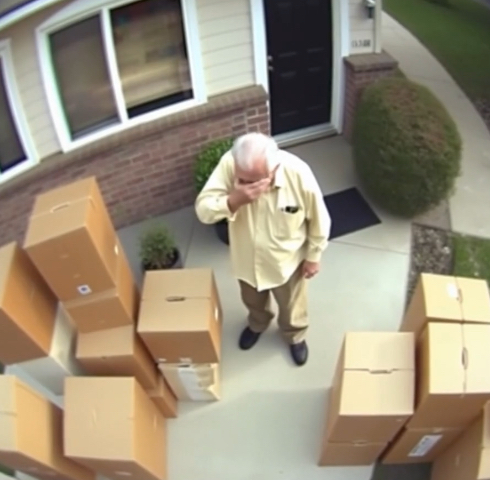 As I stood there, feeling utterly abandoned and betrayed, a car slowed down and stopped in front of me. A woman in her late fifties stepped out, her face a mixture of concern and empathy. She introduced herself as Linda, a neighbor from a few houses down the street. Linda had seen the commotion and, noticing my distress, approached cautiously.
As I stood there, feeling utterly abandoned and betrayed, a car slowed down and stopped in front of me. A woman in her late fifties stepped out, her face a mixture of concern and empathy. She introduced herself as Linda, a neighbor from a few houses down the street. Linda had seen the commotion and, noticing my distress, approached cautiously.
“Are you all right?” she asked gently, her eyes scanning the boxes and then meeting mine.
I hesitated before speaking, the words catching in my throat. “My daughter… she… she put me out,” I managed to say, my voice trembling. “I have nowhere to go.”
Linda’s expression shifted from concern to determination. “You can’t just stay out here,” she said firmly. “Let’s get you inside my house for now. We can sort this out together.”
With Linda’s help, I gathered my belongings as best as I could, and she led me to her home. Once inside, she made me a cup of tea and listened patiently as I recounted the events. I could see the disbelief in her eyes, but also a spark of anger at the injustice.
“Have you tried talking to your daughter again?” Linda asked, her voice laced with sympathy.
I shook my head. “I don’t know what to say to her. She seemed so… different.”
Linda nodded. “Sometimes people act out of fear or stress. Maybe she felt overwhelmed, thinking she had no other option.”
We spent the next few hours discussing possible solutions. Linda suggested contacting social services. They could provide guidance on elder care resources that didn’t involve a nursing home. She also offered to help mediate a conversation with my daughter.
Days passed, and Linda kept her word. She contacted social services and arranged a meeting with my daughter. It was tense, to say the least. My daughter seemed defensive, guilt and frustration battling for dominance on her face.
“Dad,” she began, her voice softer than before. “I never wanted to hurt you. I just didn’t know what to do. The doctors scared me, saying you needed more care than I could provide. I thought a nursing home was the only option.”
I took a deep breath, the anger and sadness still lingering but softened now by an understanding of her fears. “I just want to stay in my home,” I said. “We can find support. I don’t want to lose these last moments with you.”
She nodded, tears glistening in her eyes. “Let’s work together to find a solution,” she agreed.
With Linda’s help and the guidance of social services, we were able to arrange for in-home care. It wasn’t perfect, but it was a compromise that allowed me to stay in my familiar surroundings, surrounded by the memories that my home held.
Reflecting on this tumultuous period, I realized how important communication and support networks are. It taught me that sometimes people make decisions out of fear, and addressing those fears openly can pave the way for understanding and resolution.
So, to anyone reading this, if you find yourself in a similar situation, reach out to those around you. People like Linda are out there, ready to help. And sometimes, a difficult conversation is all it takes to mend what’s broken.